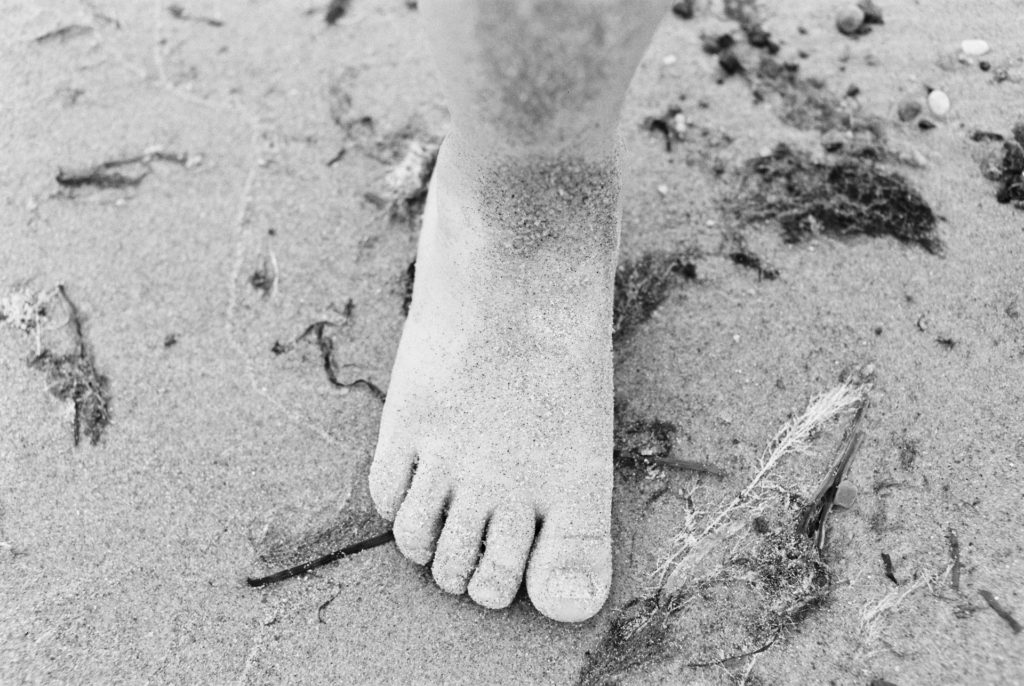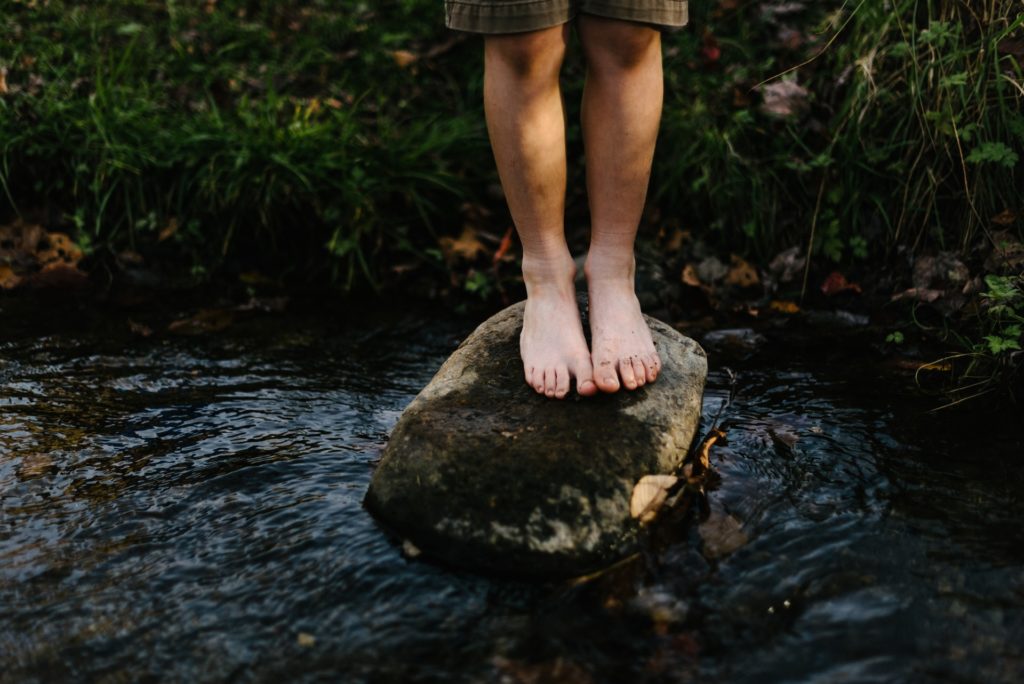Fun Activities & Games, Sensory Processing
How to Boost Mental Accuity by Allowing Children to Barefoot Play

We recently shared an article that discussed the wonderful benefits children enjoy by gardening.
It described how Tonja du Toit of Citipointe Childcare Centre set up a sensory children’s garden for her students to enjoy and gave insight on helping sensory development in kids and boost brain development.
I want to take this opportunity to add an additional reason why gardening is such a great activity! It’s an activity to enjoy the outdoors with your children or students. And furthermore, having a special garden space allows opportunity for children to be barefoot safely outdoors.
Firstly, being barefoot allows children to explore sensory input from their feet as well as hands. In addition, being barefoot is a critical element of proper growth, development, and nervous system functioning.
Studies Show that Being Barefoot is Helping Sensory Development in Kids and Boosts Brain Development
How is that possible?
“Feet are one of the most sensory-rich parts of the human body. The soles of the feet are extremely sensitive to touch, and there are large concentrations of proprioceptors in the joints and muscles of the feet. In fact, the feet alone have as many proprioceptors as the entire spinal column!” Kacie Flegal, D. C.
Without a doubt, play is the most important activity in which human beings engage throughout their lives. Through playful exploration from infancy we form the basic ideas about ourselves and our world.
Importantly, it is these basic ideas about ourselves upon which everything else is built.
Receiving and experiencing the world through play with a wide variety of objects, in a wide variety of places and wide variety of ways provides challenges for growth and development, and learning (even in adulthood!).
Our future success at negotiating life’s challenges is dependent on the effectiveness of those neural connections that form when we are very young.
So, a healthy diet of play with the right materials supported by the significant adults around us, is the most important facilitator of neural growth and development throughout childhood.
Babies are born ready to adapt, and to learn how to deal with the world they are born into. They are so incredibly responsive to their world that the human brain grows massively in the first few years of life.
So the human brain is growing and developing neuronally, physically and in ability through rich life experiences in a nurturing and loving environment.
The 8 Senses (Not Just 5) & How They Contribute to Early Brain Development
Consider our five senses of: sight, smell, sound, taste, and touch. Additionally, we occupational therapists have added the senses of:
- movement (vestibular sense),
- the sense of body position (proprioceptive sense) and the
- sense of interoception (identify what is happening inside the body, e.g. hunger, toileting needs, breathing, and more).
Each of these eight senses provides us with information about our world. Through our bodies, to our brain, we interpret what is going on around us.
Specifically, these senses all give our brain feedback about our body (and related to children barefoot play and helping sensory development in kids):
- our sense of touch (the feel of dirt and grass underfoot in the garden),
- the sensation of proprioception or position of the body (keeping balance in soft soil, or uneven surfaces),
- sensation of movement (bending, digging, pulling weeds),
- the sensation of interoception (is it time for a break?), and
- the sense of taste and texture in the mouth (oops – dirt on fingers!).
Conversely, the senses that provide information about the environment around us are:
- vision (the beauty of green leaves, flowers),
- auditory (hearing) (the sound of insects, birds, the wind in the trees) and
- smell (the smell of freshly mown grass, or just-turned soil).
The whole process by which our body parts, sensory receptors, nervous system, and brain give us feedback and react to our environment is called sensory integration.
Most noteworthy is the fact that the way our sensory integration develops affects us for the rest of our lives. For example, our ability to self-regulate during varying levels of stimulation is one effect.
How sensitive we are to:
- changes in our environment and our routine,
- our immune system’s ability to maintain equilibrium,
- our diet,
- physical coordination, and
- future academic performance
are all linked to early sensory development.
Vestibular System & Proprioception
The specific neural connections being formed during our early years that affect our sensory integration include the vestibular system and proprioception.
The vestibular system is the input and regulation of balance and coordination during changes in center of gravity, posture, and head position shift.
Proprioception is the awareness of our body in space and the effort used to create movement. Stimulating these systems early are so important and yet highly underestimated.
Babies learning
During the first two years, babies gain awareness through sensory input from the five primary senses. They also gain awareness through the 3 secondary senses.
As they gain this awareness, they begin performing deliberate movements. This leads them to gradually learn to hold up their heads, roll over, sit up, crawl, and start walking.
Natural stimulation
All of these movements stimulate the vestibular and proprioceptive systems naturally. Thanks to the high concentration of proprioceptors in the feet, allowing children barefoot exploration out of doors contributes greatly.
So, the information sent to the brain from tactile, proprioceptive, and vestibular pathways inhibits other superfluous sensory input. This allows the brain to fine-tune movement and focus on the awareness of the environment as they move.
Socks and shoes
If, however, a child becomes accustomed to wearing socks or shoes, the proprioceptors in their feet and joints are not optimally stimulated. So, vestibular input is blocked or weakened.
Instead, when feet are bare, the muscles and joints in the feet and ankles make minor adjustments to the feedback of changing terrains, textures, and temperatures. Allowing children barefoot play is so important to helping sensory development in kids!
Therefore, one of the simplest ways to motivate proprioceptive and vestibular development is to let our kids be barefoot as much as possible!

“Children have been moving in sneakers for physical activity for so long we seem to have forgotten that feet do have sentient qualities. They can be used to grip the floor for strength and balance, and their different parts (toes, ball, sole, heel) can be more easily felt and used when bare.
Furthermore, there is evidence indicating that going barefoot strengthens feet and improves body alignment. Young children feel a natural affinity for the ground that can be enhanced by removing all the barriers between it and the feet.” Rae Pica
Need Help with Tips for Enabling Children Barefoot Play Outdoors?
Looking for tips for encouraging outdoor play with your children this year? If so, check out these past pieces we’ve done (see below). Or, consider signing up for our CoordiKids Classroom Course.
This much loved program is a series of exercises specifically targeting vestibular and proprioceptive systems. Our program is designed to be done for just 15 minutes a day, from any mobile device. So you can take it to the park or in the backyard barefoot!
About the Sources & Quoted Authors:
Rae Pica has been an education consultant since 1980. She specializes in the development and education of the whole child and children’s physical activity. Rae is one of the foremost child development experts in education.
She is author to over 19 books, including Running Start: How Play, Physical Activity, and Free Time Create a Successful Child. Rae served on the task force of the National Association for Sport and Physical Education (now SHAPE America).
This organisation created national guidelines for early childhood physical activity. She is also a member of several advisory boards, and serves on the executive committee of the Academy of Education Arts and Sciences International. In addition, Rae is an expert for NBC’s “Education Nation”.
Dr. Kacie Flegal, D.C. is a vitalistic chiropractor and member of the International Chiropractic Pediatrics Association (ICPA). She specializes in pre- and post-natal care, pediatrics, and serving individuals with sensory integration challenges.